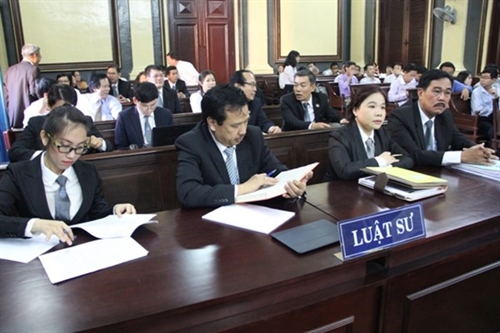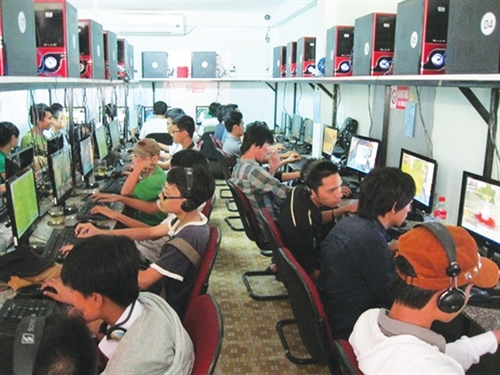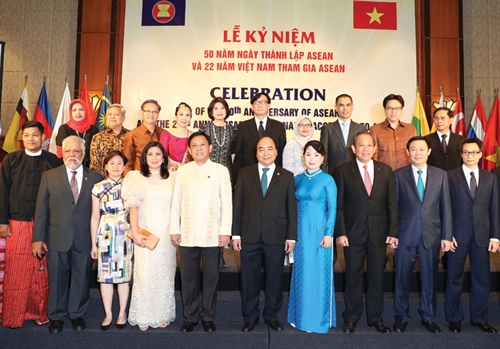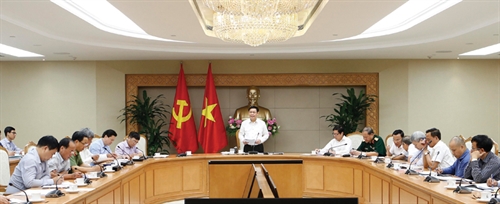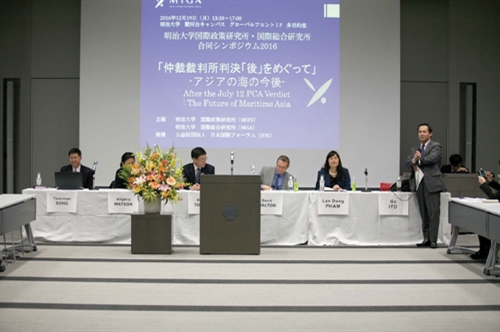Rule-of-law institutions of citizens and of the state are part of a rule-of-law state. The history of building rule-of-law states around the world shows that in order to successfully build rule-of-law institutions of the state, it is a must to simultaneously establish, or even give priority to establishing, rule-of-law institutions of citizens.
Nguyen Thanh Tuan, Assoc. Prof., Dr.
Human Rights Research Institute
Ho Chi Minh National Politics Academy
Existing problems in the citizen-state relationship in Vietnam
In Vietnam the views and methods of building and completing a rule-of-law state have so far mostly focused on building and completing the rule-of-law institutions of the State while paying undue attention to building the rule-of-law institutions of citizens as the foundation and goal of organization and operation of a rule-of-law state. As a consequence, although the process of building a socialist rule-of-law state has taken place for over 20 years, the people as well as state officials and employees hardly have a true relationship with the State based on their civil rights. In many cases such relationship bear the “communal-affectionate”, “individual-private” and subsidy relation characteristics.
The “communal-affectionate” characteristic is manifested through the “uncle-nibling”, “brotherly” and “sisterly” relations in both public and private matters in state agencies. The “individual-private” characteristic exposes itself in the mere pursuit for individual interests, lax discipline and wrongful behaviors toward the people among a portion of state officials and employees.
The subsidy characteristic is not simply a remnant of the centralized subsidy system but, in essence, is both an attribute of and a mechanism for realizing the “communal-affectionate” and “individual-private” characteristics. It is expressed in the fact that many people inside and outside the State are still trying to cling to state-subsidized resources (state budget, official development funds, state payroll, etc.).
It can be said that “communal-affectionate”, “individual-private” and subsidy relations have obscured the position and role of citizens, citizens’ relationship and state discipline, which are generally referred to as the rule of law.
The objective causes of the above problems are the low socio-economic development level and vestiges of the small-peasant psychology and feudal thinking still dominating among a portion of members in the society, and particularly the effects of competitive relations in a market economy. All of these factors have put the rule-of-law relations of citizens and rule-of-law institutions of the State in a position fiercely competitive with “communal-affectionate”, “individual-private” and subsidy relations of individuals and even many state agencies. This competition has caused negative effects in many aspects, particularly on the interrelations between the State and citizens, from the building and passage of laws and regulations to the attitude, responsibility and operation of state agencies and behaviors of state officials and employees in dealing with state affairs and in relationships with citizens.
Subjectively, in the development of theories and legal institutions on a socialist rule-of-law state, we have not yet paid due attention to the equal relations between the State and citizens. We seem to have paid attention to only building rule-of-law institutions of the State, but not building and developing citizens’ rights, human rights and citizens’ relations as the foundation and goal of a rule-of-law state.
While the State requires citizens to fulfill their obligations and responsibilities, in many cases, the State and its agencies lack, or almost ignore issuing regulations on their obligations or fulfilling their obligation to guarantee citizens’ rights. Particularly, the vigorous development of the socialist-oriented market economy, international integration and the requirement for further building and completing institutions of a rule-of-law socialist state have given and will give rise to more complicated issues in the promotion of equal relations between the State and citizens. These relations include: (1) interrelations between the State, businesses and citizens in the development and settlement of issues related to development facilitation, start-up, production and business, or more directly to the recovery of land and compensation for land use rights and ground clearance; (2) interrelations between the State and citizens in the development and settlement of social issues; (3) interrelations between the State and citizens in the development and settlement of international integration issues; (4) interrelations between the State and citizens in the establishment of the position and role of citizens in the capacity as state officials and employees; and (5) equal relations between citizens and equal relations between citizens and state institutions.
Generally speaking, it seems that in Vietnam citizens still relate with the State according to their subjective views; and a significant portion of state officials and employees behave somehow arbitrarily according to their subjective view in their relations with citizens. These subjective relations have restrained the development of objective relations between citizens and the State, thus negatively affecting the process of building and completing the rule-of-law institutions of the State as well as of citizens.
 |
| Local people carry out formalities at the Public Administration Center of Dong Nai province__Photo: Le Xuan/VNA |
Building the rule-of-law institutions of citizens and of the State
Citizens are the foundation and purpose of existence of the State, and the State is a legal framework for citizens to carry out activities in order to achieve their purposes. Therefore, the 12th National Party Congress affirmed it is a must to “shift from humanitarian assistance to guaranteeing the right to social security of citizens.”
In light of this, in our country today, it is necessary to guarantee citizens’ rights in general for building and completing a socialist rule-of-law state.
However, in reality the recognition and establishment of equal rights of citizens is not an easy task and the recognition and establishment of equality under law between citizens and the State is even more difficult. In order to achieve these objectives, it is necessary to implement the following basic solutions:
The first solution is to further build and complete the framework of institutions of a rule-of-law state in order to perform the duty to guarantee justice, human rights and citizens’ rights.
We have so far addressed the equal relationship between citizens and the State largely through socialist legality. The similarity between socialist legality and a rule-of-law state consist in the requirement for the state to have an increasingly complete legal system. Socialist legality demands citizens, including state officials, employees and agencies, to strictly abide by the law. A rule-of-law state underscores the principle that all state agencies are placed under the law. Both socialist legality and a rule-of-law state require strict protection of the law and fight against law violations. Yet, a rule-of-law state has a clearer, more specific and broader content as it also covers the equal relationship between citizens’ rights and the state’s obligations under the law. A rule-of-law state, while affirming the role of the legislative body in creating an equal framework of law for the operation of all organizations and citizens, lays a special stress on the role and duty of the executive and judicial systems to guarantee the citizens’ rights and human rights.
In Vietnam, the view on a rule-of-law state was originally put forth at the second plenum of the 7th National Party Congress on November 29, 1991. Article 2 of the 1992 Constitution (revised in 2001) provided for the first time the “socialist rule-of-law state. Article 2, 3 and 4 of the 2013 Constitution prescribes the institutions of the state, citizens and the ruling Communist Party of Vietnam in our socialist rule-of-law state. Especially, the 2013 Constitution devotes Chapter 2 to constitutionalizing human rights and citizens’ basic rights and obligations. Yet, the building and completion of institutions of citizens’ rights are not on par with the building and completion of institutions of a rule-of-law state. On the basis of the 2013 Constitution, it is necessary to build and complete institutions of a socialist rule-of-law state in the following direction:
- Continuing to build the legal framework to be increasingly complete and stable with a system of legal norms that subject the power of citizens and the State to limits. Within this framework, the competence and norms of state agencies and citizens are clear and will become effective or the rule of law only when they comply with all norms of higher effect (and also of lower effect). On top of the legal system is the Constitution with a constitutional protection mechanism having the transparent adjudicating jurisdiction. This is the nucleus for the legal framework to rule.
- Institutionalizing the legal framework of the State: All decisions of the State must adhere to the principle of being controlled by public power within the general legal framework, which is primarily based on the constitutional principles. On this principle, sanctions targeted at the State will become powerful: regulations promulgated by the State and decisions issued by the State must comply with all legal norms of higher effect (laws, treaties and constitutional principles), and are not entitled to any priority in terms of jurisdiction. To achieve this, it is necessary to adhere to the fundamental principle that the legislative, executive and judicial powers must be assigned, coordinated and checked by one another in the organization and operation of the State.
Within the legal framework, legal norms are arranged in an orderly way to force citizens and the State (its institutions, staffs, managerial documents, even the highest ranking state officials) to abide by the law. Within this framework, the role of judicial bodies is extremely necessary and the independence of justice is natural and mandatory because they are the only ones that are vested with the right to interpret laws and conduct trials by law. Therefore, efforts should be concentrated on building and completing the legal framework of state agencies to ensure that they perform the duty of guaranteeing justice, human rights and citizens’ rights. Specifically, we need to have more specific and clear regulations on the rights and obligations of state agencies, titles and positions of state officials and employees, particularly on the guaranteeing institutions (mechanisms) and legal bindings on the responsibility of state agencies to citizens for acts that cause damages to citizens during the performance of official duties in all three aspects: organization, personnel, and administrative management documents (or public-service documents).
At present, the above institutions (mechanisms) reveal many shortcomings and limitations in legal provisions, particularly the mechanism of controlling managerial documents of state agencies, and in their practical implementation. By now, the State has issued some documents concerning these institutions, such as the Civil Code providing the liability of state agencies for compensating damage caused by their officials and employees; the liability of proceeding-conducting bodies for compensating damage caused by their competent persons when carrying out legal proceedings; and the Administrative Law providing the liability to pay material compensation for damage caused by state agencies and employees to citizens.
However, the above provision are still insufficient, such as lacking guaranteeing institutions and legal bindings on holding state agencies responsible for their administrative management documents. Despite the existence of such legal provisions, in many cases, state agencies and employees still do not want to perform their responsibility, pass their responsibility to others, cause delays in the settlement of citizens’ affairs but do not bear any responsibility. This situation in state management work should be addressed.
The second solution is to further institutionalize human rights, citizens’ rights and the principle of equality in rights and obligations of citizens with a view to putting in place the rule-of-law institutions of citizens.
One very important issue now is to institutionalize the constitutional rights of citizens, including human rights and citizens’ rights, so that they are truly guaranteed in real life. At the same time, it is necessary to concretize the principle of equality in rights and obligations of citizens in a way that the rights of the State are guaranteed by the obligations of citizens and vice versa.
Citizens’ rights should be institutionalized in the direction that citizens inside and outside state agencies are all equal, not discriminated in their relations with the State, specifically:
- Natural persons as well as legal persons are all equal before the law. Accordingly they can challenge on an equal basis any decisions of state authorities.
- Freedoms and democratic rights of citizens and the rights of legal persons should be connected in conformity with the Constitution. To achieve this, the system of legal norms must be arranged in an orderly way so that citizens inside and outside state agencies all bear responsibility to the State; at the same time the State is obliged to guarantee human rights and the rights of citizens inside and outside the State. There will be no rule-of-law state if there is no equal relationship between citizens and the state.
- Legal provisions on human rights and citizens’ rights should be improved and concretized in the direction that “citizens can do everything that is not prohibited by law.” The rights and obligations of citizens in their relationship with the State in the capacity as citizens as well as state officials or employees should be specified.
- It is necessary to continue building and completing the legal framework on social criticism and supervision to heighten the role of social organizations and mass media in the inspection and supervision of state agencies, officials and employees, aiming to detect violations in the relationships between citizens and the State.
- The contingent of state officials and employees should be urged to raise their sense of responsibility toward citizens, better performing their duty to guarantee citizens’ rights and fostering the attitude to bear responsibility when performing official duties.
- The role and responsibility of Party organizations and members in leading the building and completion of the legal system on the relationship between the State and citizens should be promoted. The Party Central Committee and Party inspectorates should increase inspections of Party organizations and Party members holding positions in state agencies to make sure that they operate within the legal framework and subject to strict supervision by law. Party members who violate the Party rules and State laws on the relationship between citizens and the State must be strictly punished.
The third solution is to build the interrelationship between the State, society and citizens on the principle of respecting the Constitution and laws.
The State’s intervention in the sector of enterprises and social organizations should be limited and implemented through such measures as optimally reducing the criminalization of production and business activities of people; promoting startup campaigns; further bringing into play the role and position of socio-political, socio-professional and social organizations. These measures will help build a state that facilitates development and promote the proper relationship between the State, society and individuals (citizens). And in the relationship with the market, society and individuals, the State should only assume the role of setting playing rules, grounds and methods, and organizing the provision of public services.
The State’s intervention in social institutions should be implemented by means of law. However, there should be a combination between social management by law and by ethics. The State uses the law to manage the society but should complement the law with selected traditional values that the present-day life still needs. The method is to take the law as the pillar and use traditional customs to offset legal flaws and loopholes or to concretize the law (for implementation mainly in localities and at grassroots level).
There are various control mechanisms, but whatever mechanism we choose, we must adhere to one fundamental principle of a rule-of-law state: to ensure the supremacy of the Constitution and laws through concrete institutions, not through just education and propaganda. Any individuals or collectives, including state agencies, that violate the Constitution and laws must be investigated and brought to public trial.-
